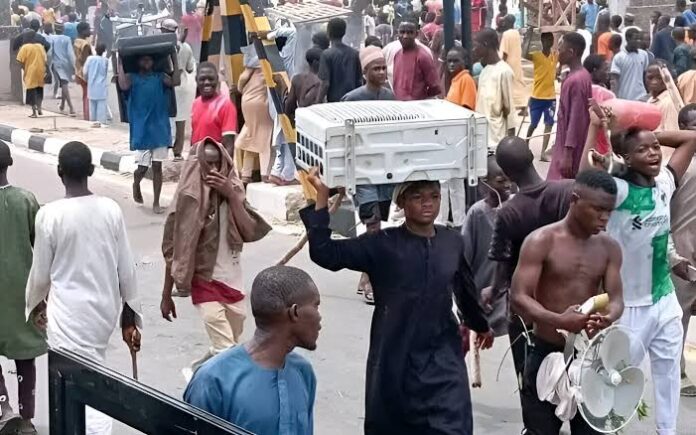In a shocking turn of events, the Nigeria Communication Commission Industrial Park in Kano, a state-of-the-art technology hub, was set ablaze by protesters on Thursday. This incident has drawn widespread condemnation from the Federal Government, particularly from the Minister of Communications and Digital Economy, Bosun Tijani, who confirmed that the facility, scheduled for launch next week, was looted and destroyed.

The destruction occurred during a series of nationwide protests against what many citizens perceive as bad governance. The protests, which have gained momentum, are fueled by widespread discontent over economic hardships, including rising living costs, unemployment, and inadequate access to quality education.
Videos circulating online depict individuals carrying away computers, chairs, and other valuable items from the facility, highlighting the chaotic nature of the protests. Tijani expressed his disappointment, stating that the destruction represents “a slight setback” for Nigeria’s digital economy ambitions and youth job creation efforts.
He lamented the loss of “millions of naira” and emphasized that the facility was intended to support the Technical Talent Accelerator program, which aims to develop Nigeria’s technical talent pipeline.
The Technical Talent Accelerator (3MTT) initiative is part of the Renewed Hope agenda, which seeks to position Nigeria as a hub for talent export. Launched with an initial target of 30,000 participants, the program has since expanded to include an additional 270,000 individuals, reflecting the growing interest in technology and innovation among Nigerian youth.
However, the destruction of the industrial park raises serious concerns about the future of such initiatives. The facility was not only a symbol of progress but also a crucial resource for young Nigerians aspiring to enter the tech industry. The loss of this hub could hinder the development of local talent and slow down Nigeria’s digital transformation efforts.
As the protests continue, scheduled to last until August 10, citizens are demanding urgent action from the government to address their grievances. The protests are a response to the escalating economic crisis, which has left many struggling to make ends meet. The government’s inability to provide basic services and improve living conditions has fueled public frustration, leading to these violent outbursts.
While the protests highlight legitimate concerns among the populace, the destruction of critical infrastructure poses a dilemma. It raises questions about the effectiveness of such actions in achieving meaningful change. Many citizens fear that violence and vandalism could overshadow the genuine calls for reform and lead to a crackdown on dissent.
Furthermore, the incident in Kano reflects a broader trend of unrest across Nigeria, where citizens feel increasingly disenfranchised. The government must find ways to engage with the public and address their concerns without resorting to heavy-handed tactics that could escalate tensions further.
The burning of the Nigeria Communication Commission Industrial Park in Kano is a stark reminder of the challenges facing Nigeria today. As the nation grapples with economic difficulties and widespread dissatisfaction, it is crucial for the government to listen to its citizens and work towards solutions that promote stability and growth. The destruction of vital infrastructure not only sets back progress but also undermines the potential for a brighter future for Nigeria’s youth.




